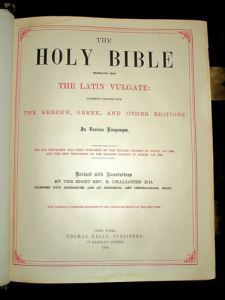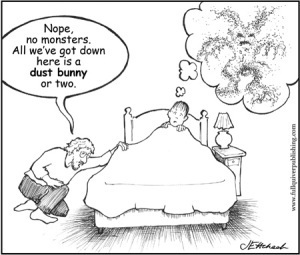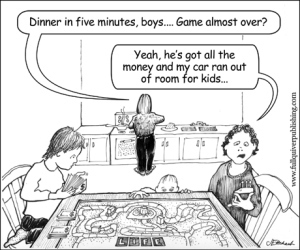Ellen Gable's Blog, page 90
March 17, 2013
Sunday Snippets – March 17
 Join me and other Catholic bloggers over at RAnn’s Place for Sunday Snippets where we share posts from the previous week.
Join me and other Catholic bloggers over at RAnn’s Place for Sunday Snippets where we share posts from the previous week.
Happy St. Patrick’s Day!
It was an exciting week with the election of Pope Francis. The more I read about him, the more I love him. The Holy Spirit has given us a great gift with this Pope.
Here are my posts:
Want to Promote the Theology of the Body? Read and Recommend TOB Fiction!
Narrative Voice, Characterization and Reading to Improve Writing
7 Quick Takes Friday – March 15
Copyright 2013 Ellen Gable Hrkach


March 15, 2013
7 Quick Takes Friday – Volume 63
 It’s Friday, which means it’s time to connect with Conversion Diary for 7 Quick Takes:
It’s Friday, which means it’s time to connect with Conversion Diary for 7 Quick Takes:
1. Habemus Papam
Lots in the news about Pope Francis so some of my QT will be about our new Pope. The more I read about him, the more I love him. Check out this article about how the new Pope is changing routines at the Vatican. Pope Francis is a man who is not only faithful to Church doctrine, he is particularly concerned about the poor. The Catholic Church is in good hands.
2. Pope Francis, in His Own Words
To read more about his thoughts on various topics, click here.
3. 10 Facts About the New Pope
10 Facts About the New Pope
4. The O’Donovan Family Saga Continues
Work continues on my novel, A Subtle Grace, the sequel to
5. This Week’s Research: Laudanum
Since one of the main characters in “A Subtle Grace” is a physician, I needed to research common drugs and pain medication of the 19th century. One of the most common was laudanum, which is a mixture of alcohol and opium. Strangely enough, laudanum/opium were both available for purchase in the 1897 Sears and Roebuck Catalog (see below). Here is Wikipedia’s information on laudanum.
6. On My Reading Shelf
One Like Us by Jerome German
This Little Light of Mine: Living the Beatitudes by Kathleen Basi
Season of Joy by Virginia Carmichael
image copyright James and Ellen Hrkach
Copyright 2013 Ellen Gable Hrkach


7 Quick Takes Friday – March 15
 It’s Friday, which means it’s time to connect with Conversion Diary for 7 Quick Takes:
It’s Friday, which means it’s time to connect with Conversion Diary for 7 Quick Takes:
1. Habemus Papam
Lots in the news about Pope Francis so some of my QT will be about our new Pope. The more I read about him, the more I love him. Check out this article about how the new Pope is changing routines at the Vatican. Pope Francis is a man who is not only faithful to Church doctrine, he is particularly concerned about the poor. The Catholic Church is in good hands.
2. Pope Francis, in His Own Words
To read more about his thoughts on various topics, click here.
3. 10 Facts About the New Pope
10 Facts About the New Pope
4. The O’Donovan Family Saga Continues
Work continues on my novel, A Subtle Grace, the sequel to
5. This Week’s Research: Laudanum
Since one of the main characters in “A Subtle Grace” is a physician, I needed to research common drugs and pain medication of the 19th century. One of the most common was laudanum, which is a mixture of alcohol and opium. Strangely enough, laudanum/opium were both available for purchase in the 1897 Sears and Roebuck Catalog (see below). Here is Wikipedia’s information on laudanum.
6. On My Reading Shelf
One Like Us by Jerome German
This Little Light of Mine: Living the Beatitudes by Kathleen Basi
Season of Joy by Virginia Carmichael
image copyright James and Ellen Hrkach
Copyright 2013 Ellen Gable Hrkach


March 13, 2013
Habemus Papam
 We have a new Pope! Cardinal Jorge Mario Bergoglio of Argentina has become Pope Francis after being elected the 266th Pope of the Catholic Church.
We have a new Pope! Cardinal Jorge Mario Bergoglio of Argentina has become Pope Francis after being elected the 266th Pope of the Catholic Church.
To find out more about our new Pope, LifeSiteNews has an informative article entitled “9 Things You Should Know About Pope Francis.”
Like many people around the world, I watched the events unfold on television. I was surprised — and pleased — with his choice of the name “Francis” and I was deeply moved by his humility.
Join me in praying this prayer for the Pope Francis.


March 12, 2013
Narrative Voice, Characterization and Reading to Improve Writing
 My latest post at the CWG Blog:
My latest post at the CWG Blog:
Novelists should always be willing (and eager) to improve their craft. Writing fiction is difficult and complex because of the many complicated aspects (narrative voice, writing style, imagery, plot lines, characterization, setting etc).
Whether you’re a bestselling author or an aspiring novelist, one of the best ways to improve your writing is by reading well-written novels. Read books and dissect them. Ask yourself, What makes this particular novel great? What makes it not-so-great?
William Faulkner once said, “Read, read, read. Read everything – trash, classics, good and bad, and see how they do it. Just like a carpenter who works as an apprentice and studies the master. Read! You’ll absorb it. Then write.”
Currently, I read at least 100 books a year, mostly novels. I enjoy immersing myself in a compelling story with believable, relatable characters, rich imagery. These are the types of novels I aspire to write.
I read at night before bed and often first thing in the morning. I read manuscripts that are submitted to my publishing company. I enjoy a variety of contemporary novels and often read a classic or two here and there.
When I was a newbie, my editor recommended I read several books, then asked me to figure out what each book’s strength was. The first novel on the list was a book entitled “Picture Perfect,” by Jodi Picoult. (Spoiler alert) It’s a novel about spousal abuse. Picoult brilliantly creates an abusive – yet sympathetic – husband. So much so that when the abusive husband is begging his wife to return, I said out loud, “Oh, give the poor guy another chance.” I eventually came to my senses, but I realized that it was the author’s brilliant characterizations that made me want the abused wife to return to her abuser.
The following list is recommended for helping with character studies and narrative voice. It is, by no means, definitive. There are literally thousands of great novels with excellent characterizations.
Gone With the Wind by Margaret Mitchell (I own a hard copy but downloaded this on Kindle for .99). This has remained my favorite book of all time and I read it every few years. Mitchell only wrote one novel but it is the quintessential novel, especially if you’re writing romance. This book has the whole package: excellent, crisp writing, compelling story, intricate, believable and brilliant character studies. (More on the “Whole Package” novel in my next post.)
My Sister’s Keeper by Jodi Picoult: The winner of numerous awards, this novel is filled with brilliant character studies and narrative voices. The movie version was okay, but the book is much better (although like most of Picoult’s books, the ending is unexpected).
The Complete Stories by Flannery O’Conner: Just pick any of the short stories in this thick book and you’ll learn from O’Connor, who was a master of crisp, edgy writing and excellent characterizations.
Brideshead Revisited by Evelyn Waugh: A classic. Brilliant characterizations.
Death Comes for the Archbishop by Willa Cather: (read my review here) Also a classic.
The Lottery (short story) by Shirley Jackson (available free online) Excellent character studies.
Jewel by Bret Lott: This novel’s strength is the main female protagonist’s believable, moving, well-developed character.
A Farewell to Arms by Ernest Hemingway: This is my personal favorite of Hemingway’s novels. In this atypical war romance, I think the author’s strength is in the characterizations of the two main characters. I saw the movie with Rock Hudson and Jennifer Jones first, but the book captures their characters better than the movie. (Currently .99 on Kindle)
Do you have any favorite books or short stories that are strong in narrative voice and characterization? If so, please feel free to comment below.
Next month: The Whole Package and Reading Books that encompass great characters, unpredictable compelling stories AND rich, crisp writing.
Copyright 2013 Ellen Gable Hrkach


March 11, 2013
Want to Promote Theology of the Body? Read and Recommend a TOB Novel!
 One of my favorite ways to promote the Theology of the Body is to recommend novels with a great TOB message. My publishing company publishes novels with Theology of the Body themes.
One of my favorite ways to promote the Theology of the Body is to recommend novels with a great TOB message. My publishing company publishes novels with Theology of the Body themes.
Speaking of novels we publish, our company has recently signed a contract with author Erin McCole Cupp to publish her suspense novel, “Don’t You Forget About Me!” We look forward to working with you, Erin!
Want to learn more about the Theology of the Body? Interested in promoting it? This list is not all-inclusive…and pardon the shameless self-promotion of my own TOB books… (Note: not all of these books have been published by Full Quiver Publishing.)
The Mystery of Things (Debra Murphy)
Emily’s Hope (Ellen Gable)
(Ellen Gable)
Stealing Jenny (Ellen Gable)
Passport (Christopher Blunt)
Angela’s Song (AnnMarie Creedon)
Fatherless (Brian Gail)
Lessons in the Journey (Patrick Dawson)
Do you have any favorite TOB novels to add? Please feel free to comment below!
Copyright 2013 Ellen Gable Hrkach


March 9, 2013
Sunday Snippets – March 9
Image copyright Ellen Gable Hrkach
The weekend is here, along with Sunday Snippets where Catholic bloggers meet up at RAnn’s Place to share posts.I’m still working diligently on my upcoming novel, so only two posts this week:
7 Quick Takes Friday – March 8


March 8, 2013
7 Quick Takes Friday – March 8
 It’s time for 7 Quick Takes Friday over at Jen’s Conversion Diary.
It’s time for 7 Quick Takes Friday over at Jen’s Conversion Diary.
1. Adopt a Cardinal
If you haven’t already done so, consider “adopting” a cardinal and praying for him during the upcoming conclave.
2. There’s A Saint For That
Thanks so much to Aniya for alerting me to this cleverly illustrated website that showcases different and unusual patron saints. I knew there were patron saints for things like the internet, accountants and brides…but I never realized there were saints for mad dogs, beekeepers and other unusual occupations and situations. Information on where the saint was born and died, as well as a brief biography, are listed.
3. Duty of the Moment
One of my favorite passages from Catherine Doherty is on the “Duty of the Moment,” which can be found here at the Madonna House website. A brief quote below: “The duty of the moment is what you should be doing at any given time, in whatever place God has put you. If you have a child, your duty of the moment may be to change a dirty diaper. So you do it. But you don’t just change that diaper, you change it to the best of your ability, with great love for both God and the child. Do you do it that way? You can see Christ in that child.” I highly recommend all of Catherine’s books, most of which are available from Madonna House.
4. A Subtle Grace Research
I thoroughly enjoy the research that takes place while writing an historical novel. The other day I wanted to visually see what the inside of an 1881 Douay Rheims (Latin Vulgate) Bible looked like and here’s what I found:

5. Excellent Article by Jen
“Why I Lost Faith in the Pro-Choice Movement”
6. Reading Shelf
The Third Testament by John Eklund
Becoming A Great Grandparent by Paraclete Press
image copyright James and Ellen Hrkach
copyright 2013 Ellen Gable Hrkach


March 6, 2013
Adopt a Cardinal
 Please consider adopting a cardinal and praying for him now and throughout the upcoming papal conclave. Our family has adopted a cardinal and we are praying daily for him.
Please consider adopting a cardinal and praying for him now and throughout the upcoming papal conclave. Our family has adopted a cardinal and we are praying daily for him.
For more information, click here.


March 3, 2013
Sunday Snippets – March 3
Image copyright Ellen Gable Hrkach
Join me at RAnn’s Place for Sunday Snippets where Catholic bloggers share posts from the previous week.7 Quick Takes Friday – Volume 61 (Update on A Subtle Grace, Farewell to Pope Benedict, a cartoon etc.
Copyright 2013 Ellen Gable Hrkach








